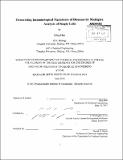Generating immunological signatures of diseases by multiplex analysis of single cells
Author(s)
Han, Qing, Ph. D. Massachusetts Institute of Technology
DownloadFull printable version (16.63Mb)
Other Contributors
Massachusetts Institute of Technology. Dept. of Chemical Engineering.
Advisor
J. Christopher Love.
Terms of use
Metadata
Show full item recordAbstract
The large diversity of cells that comprise the human immune system requires methods that can resolve the contributions of individual cells to an immunological response. The release of cytokines is one of several important functions carried out by immune cells. Analytical methods that yield multiple measures of the breadth and quality of cytokine secretion from heterogeneous populations are highly desired in basic and clinical immunology. Microengraving is a process that uses a dense, elastomeric array of nanowells to generate microarrays of proteins secreted from large numbers of individual live cells. In this thesis, we improved the sensitivity and multiplicity of microengraving and adapted it to detect cytokine secretions from primary immune cells. We demonstrated that microengraving could provide quantitative measurements of both the frequencies and the distribution in rates of secretion for up to four cytokines simultaneously. The experimental limits of detection ranged from 0.5 to 4 molecules/s for most cytokines in our experiments. These multidimensional measures resolve functional responses by cells exposed to stimuli with greater sensitivity than single-parameter assays. Primary T cells with specific profiles of secretion can also be recovered after microengraving for subsequent expansion in vitro. The release of multiple cytokines by T cells has been associated with beneficial immune responses. To date, however, time-integrated end-point measurements have not resolved the temporal dynamics of these functions. Here, we used serial microengraving to measure Thlskewed cytokine responses (IFN[gamma], IL-2, TNF[alpha]) from individual cells after activation ex vivo. The results show that multifunctional cytokine responses are initiated asynchronously but the ensuing dynamic trajectories of these responses evolve programmatically in a sequential manner. Furthermore, these dynamic trajectories are strongly associated with the various states of cell differentiation, suggesting that transient programmatic activities of many individual T cells contribute to sustained, population-level responses. The trajectories of responses by single cells may also provide unique, time-dependent signatures for immune monitoring that are less compromised by the timing and duration of integrated measures. Together, these results demonstrate the utility of quantitative, multidimensional profiles of single cells for analyzing the diversity and dynamics of immune responses in vitro, thus generating immune signatures for diseases.
Description
Thesis (Ph. D.)--Massachusetts Institute of Technology, Dept. of Chemical Engineering, 2012. Cataloged from PDF version of thesis. Includes bibliographical references (p. 135-142).
Date issued
2012Department
Massachusetts Institute of Technology. Department of Chemical EngineeringPublisher
Massachusetts Institute of Technology
Keywords
Chemical Engineering.